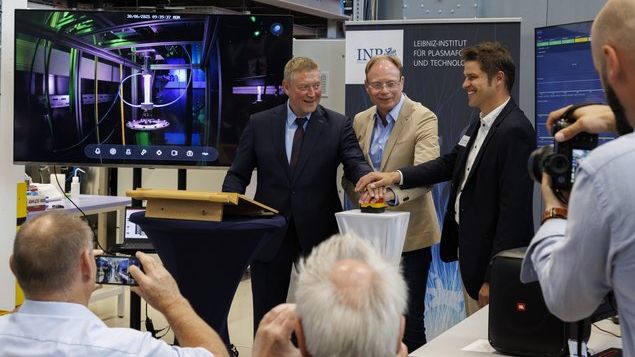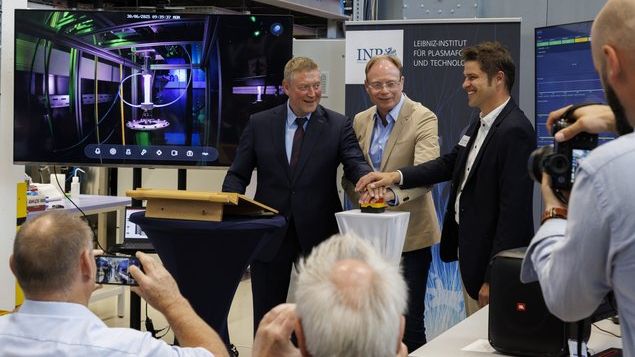
News -
Project of the ‘Research Factory Hydrogen MV’ opened at the Greifswald site
End of June, a new PtX plasma development environment at the Leibniz Institute for Plasma Researchand Technology (INP) in Greifswald was opened with a visit from State Secretary Jochen Schulte, representing Mecklenburg-Western Pomerania's Minister of Economics, Dr. Wolfgang Blank. The facility is part of the state-wide Forschungsfabrik Wasserstoff MV and marks an important milestone for the further development and establishment of innovative technologies for the energy transition in Germany's north-east.
The core of the newresearch site at the INP is the development and testing of so-called plasmalysis, a process for producing hydrogen from methane. In contrast to conventional electrolysis, plasmalysis only consumes around 20 percent of the electrical energy and also produces solid carbon as a realizable by-product.
It thus combines resource efficiency with climate protection and opens up new value creation opportunities for various industries. Plasmalysis is suitable for applicationsin which hydrogen is to be used directly on site. These include biogas plants, for example, which convert green methane into emission-free hydrogen and solid carbon, enabling CO2 to be removed from the atmosphere in the long term. LNG terminals and port sides, where liquefied natural gas (LNG) is used in a more climate-friendly way, or decentralized energy systems in industrial parks or rural regions, where the compact container design enables flexible and grid-independent use, as well as maritime applications where plasmalysis can contribute to a low-emission energy supply directly on board, are also suitable.
The Forschungsfabrik Wasserstoff MV is a joint project of the INP in Greifswald, the Fraunhofer Institut für Großstrukturen in der Produktionstechnik (IGP) and the Leibniz Institut for Katalyse (LIKAT), both in Rostock. The aim of the alliance is to develop practical technologies for the green hydrogen economy.
The state of Mecklenburg-Vorpommern is funding the research factory in Greifswald with more than four million euros. The funding is part of a strategic investment program financed by the European Union, with which the Ministry of Economic Affairs aims to support the transition to a sustainable industry in the state.

